- Home
- Ken Follett
The Pillars of the Earth Page 5
The Pillars of the Earth Read online
Page 5
The slope leveled and the cart moved more easily as they approached the gateway. The carter straightened up, and Tom and Alfred did likewise. "I thank you kindly," the carter said.
Tom asked: "What's the stone for?"
"The new cathedral."
"New? I heard they were just enlarging the old one."
The carter nodded. "That's what they said, ten years ago. But there's more new than old, now."
This was further good news. "Who's the master builder?"
"John of Shaftesbury, though Bishop Roger has a lot to do with the designs."
That was normal. Bishops rarely left builders alone to do the job. One of the master builder's problems was often to calm the fevered imaginations of the clerics and set practical limits to their soaring fantasies. But it would be John of Shaftesbury who hired men.
The carter nodded at Tom's satchel of tools. "Mason?"
"Yes. Looking for work."
"You may find it," the carter said neutrally. "If not on the cathedral, perhaps on the castle."
"And who governs the castle?"
"The same Roger is both bishop and castellan."
Of course, Tom thought. He had heard of the powerful Roger of Salisbury, who had been close to the king for as long as anyone could remember.
They passed through the gateway into the town. The place was crammed so full of buildings, people and animals that it seemed in danger of bursting its circular ramparts and spilling out into the moat. The wooden houses were jammed together shoulder to shoulder, jostling for space like spectators at a hanging. Every tiny piece of land was used for something. Where two houses had been built with an alley-way between them, someone had put up a half-size dwelling in the alley, with no windows because its door took up almost all the frontage. Wherever a site was too small even for the narrowest of houses, there was a stall on it selling ale or bread or apples; and if there was not even room for that, then there would be a stable, a pigsty, a dunghill or a water barrel.
It was noisy, too. The rain did little to deaden the clamor of craftsmen's workshops, hawkers calling their wares, people greeting one another and bargaining and quarreling, animals neighing and barking and fighting.
Raising her voice above the noise, Martha said: "What's that stink?"
Tom smiled. She had not been in a town for a couple of years. "That's the smell of people," he told her.
The street was only a little wider than the ox cart, but the carter would not let his beasts stop, for fear they might not start again; so he whipped them on, ignoring all obstacles, and they shouldered their dumb way through the multitude, indiscriminately shoving aside a knight on a war-horse, a forester with a bow, a fat monk on a pony, men-at-arms and beggars and housewives and whores.
The cart came up behind an old shepherd struggling to keep a small flock together. It must be market day, Tom realized. As the cart went by, one of the sheep plunged through the open door of an alehouse, and in a moment the whole flock was in the house, bleating and panicking and upsetting tables and stools and alepots.
The ground underfoot was a sea of mud and rubbish. Tom had an eye for the fall of rain on a roof, and the width of gutter required to take the rain away; and he could see that all the rain falling on all the roofs of this half of the town was draining away through this street. In a bad storm, he thought, you would need a boat to cross the street.
As they approached the castle at the summit of the hill, the street widened. Here there were stone houses, one or two of them in need of a little repair. They belonged to craftsmen and traders, who had their shops and stores on the ground floor and living quarters above. Looking with a practiced eye at what was on sale, Tom could tell that this was a prosperous town. Everyone had to have knives and pots, but only prosperous people bought embroidered shawls, decorated belts and silver clasps.
In front of the castle the carter turned his ox team to the right, and Tom and his family followed. The street led around a quarter-circle, skirting the castle ramparts. Passing through another gate they left the hurly-burly of the town as quickly as they had entered it, and walked into a different kind of maelstrom: the hectic but ordered diversity of a major building site.
They were inside the walled cathedral close, which occupied the entire northwest quarter of the circular town. Tom stood for a moment taking it in. Just seeing and hearing and smelling it gave him a thrill like a sunny day. As they arrived behind the cartload of stone, two more carts were leaving empty. In lean-to sheds all along the side walls of the church, masons could be seen sculpting the stone blocks, with iron chisels and big wooden hammers, into the shapes that would be put together to form plinths, columns, capitals, shafts, buttresses, arches, windows, sills, pinnacles and parapets. In the middle of the close, well away from other buildings, stood the smithy, the glow of its fire visible through the open doorway; and the clang of hammer on anvil carried across the close as the smith made new tools to replace the ones the masons were wearing down. To most people it was a scene of chaos, but Tom saw a large and complex mechanism which he itched to control. He knew what each man was doing and he could see instantly how far the work had progressed. They were building the east facade.
There was a run of scaffolding across the east end at a height of twenty-five or thirty feet. The masons were in the porch, waiting for the rain to ease up, but their laborers were running up and down the ladders with stones on their shoulders. Higher up, on the timber framework of the roof, were the plumbers, like spiders creeping across a giant wooden web, nailing sheets of lead to the struts and installing the drainpipes and gutters.
Tom realized regretfully that the building was almost finished. If he did get hired here the work would not last more than a couple of years--hardly enough time for him to rise to the position of master mason, let alone master builder. Nevertheless he would take the job, if he were offered it, for winter was coming. He and his family could have survived a winter without work if they had still had the pig, but without it Tom had to get a job.
They followed the cart across the close to where the stones were stacked. The oxen gratefully dipped their heads to the water trough. The carter called to a passing mason: "Where's the master builder?"
"In the castle," the mason replied.
The carter nodded and turned to Tom. "You'll find him in the bishop's palace, I expect."
"Thanks."
"Mine to you."
Tom left the close with Agnes and the children following. They retraced their steps through the thronged, narrow streets to the front of the castle. Here was another dry moat and a second huge earthen rampart surrounding the central stronghold. They walked across the drawbridge. In a guardhouse to one side of the gateway, a thickset man in a leather tunic sat on a stool, looking out at the rain. He was wearing a sword. Tom addressed him. "Good day. I'm called Tom Builder. I want to see the master builder, John of Shaftesbury."
"With the bishop," the guard said indifferently.
They went inside. Like most castles, this was a collection of miscellaneous buildings inside a wall of earth. The courtyard was about a hundred yards across. Opposite the gateway, on the far side, was the massive keep, the last stronghold in time of attack, rising high above the ramparts to provide a lookout. On their left was a clutter of low buildings, mostly wooden: a long stable, a kitchen, a bakery and several storehouses. There was a well in the middle. On the right, taking up most of the northern half of the compound, was a large stone house that was obviously the palace. It was built in the same style as the new cathedral, with small roundheaded doorways and windows, and it had two stories. It was new--indeed, masons were still working on one corner of it, apparently building a tower. Despite the rain there were plenty of people in the courtyard, coming in and going out or hurrying through the rain from one building to another: men-at-arms, priests, tradesmen, construction workers and palace servants.
Tom could see several doorways in the palace, all open despite the rain. He was not quite sure wha
t to do next. If the master builder was with the bishop, perhaps he ought not to interrupt. On the other hand, a bishop was not a king; and Tom was a free man and a mason on legitimate business, not some groveling serf with a complaint. He decided to be bold. Leaving Agnes and Martha, he walked with Alfred across the muddy courtyard to the palace and went through the nearest door.
They found themselves in a small chapel with a vaulted ceiling and a window in the far end over the altar. Near the doorway a priest sat at a high desk, writing rapidly on vellum. He looked up.
Tom said briskly: "Where's Master John?"
"In the vestry," said the priest, jerking his head toward a door in the side wall.
Tom did not ask to see the master. He found that if he acted as if he were expected he was less likely to waste time waiting around. He crossed the little chapel in a couple of strides and entered the vestry.
It was a small, square chamber lit by many candles. Most of the floor space was taken up by a shallow sandpit. The fine sand had been smoothed perfectly level with a rule. There were two men in the room. Both glanced briefly at Tom, then returned their attention to the sand. The bishop, a wrinkled old man with flashing black eyes, was drawing in the sand with a pointed stick. The master builder, wearing a leather apron, watched him with a patient air and a skeptical expression.
Tom waited in anxious silence. He must make a good impression: be courteous but not groveling and show his knowledge without being cocky. A master craftsman wanted his subordinates to be obedient as well as skillful, Tom knew from his own experience of being the hirer.
Bishop Roger was sketching a two-story building with large windows in three sides. He was a good draftsman, making straight lines and true right angles. He drew a plan and a side view of the building. Tom could see that it would never be built.
The bishop finished it and said: "There."
John turned to Tom and said: "What is it?"
Tom pretended to think he was being asked for his opinion of the drawing. He said: "You can't have windows that big in an undercroft."
The bishop looked at him with irritation. "It's a writing room, not an undercroft."
"It will fall down just the same."
John said: "He's right."
"But they must have light to write by."
John shrugged and turned to Tom. "Who are you?"
"My name is Tom and I'm a mason."
"I guessed that. What brings you here?"
"I'm looking for work." Tom held his breath.
John shook his head immediately. "I can't hire you."
Tom's heart sank. He felt like turning on his heel, but he waited politely to hear the reasons.
"We've been building for ten years here," John went on.
"Most of the masons have houses in the town. We're coming to the end, and now I have more masons on the site than I really need."
Tom knew it was hopeless, but he said: "And the palace?"
"Same thing," said John. "This is where I'm using my surplus men. If it weren't for this, and Bishop Roger's other castles, I'd be laying masons off already."
Tom nodded. In a neutral voice, trying not to sound desperate, he said: "Do you hear of work anywhere?"
"They were building at the monastery in Shaftesbury earlier in the year. Perhaps they still are. It's a day's journey away."
"Thanks." Tom turned to go.
"I'm sorry," John called after him. "You seem like a good man."
Tom went out without replying. He felt let down. He had allowed his hopes to rise too early: there was nothing unusual about being turned down. But he had been excited at the prospect of working on a cathedral again. Now he might have to work on a monotonous town wall or an ugly house for a silversmith.
He squared his shoulders as he walked back across the castle courtyard to where Agnes waited with Martha. He never showed his disappointment to her. He always tried to give the impression that all was well, he was in control of the situation, and it was of no great consequence if there was no work here because there was sure to be something in the next town, or the one after that. He knew that if he showed any sign of distress Agnes would urge him to find a place to settle down, and he did not want to do that, not unless he could settle in a town where there was a cathedral to be built.
"There's nothing for me here," he said to Agnes. "Let's move on."
She looked crestfallen. "You'd think, with a cathedral and a palace under construction, there would be room for one more mason."
"Both buildings are almost finished," Tom explained. "They've got more men than they want."
The family crossed the drawbridge and plunged back into the crowded streets of the town. They had entered Salisbury by the east gate, and they would leave by the west, for that way led to Shaftesbury. Tom turned right, leading them through the part of the town they had not so far seen.
He stopped outside a stone house that looked in dire need of repair. The mortar used in building it had been too weak, and was now crumbling and falling out. Frost had got into the holes, cracking some of the stones. If it were left for another winter the damage would be worse. Tom decided to point this out to the owner.
The ground-floor entrance was a wide arch. The wooden door was open, and in the doorway a craftsman sat with a hammer in his right hand and a bradawl, a small metal tool with a sharp point, in his left. He was carving a complex design on a wooden saddle which sat on the bench before him. In the background Tom could see stores of wood and leather, and a boy with a broom sweeping shavings.
Tom said: "Good day, Master Saddler."
The saddler looked up, classified Tom as the kind of man who would make his own saddle if he needed one, and gave a curt nod.
"I'm a builder," Tom went on. "I see you're in need of my services."
"Why?"
"Your mortar is crumbling, your stones are cracking and your house may not last another winter."
The saddler shook his head. "This town is full of masons. Why would I employ a stranger?"
"Very well." Tom turned away. "God be with you."
"I hope so," said the saddler.
"An ill-mannered fellow," Agnes muttered to Tom as they walked away.
The street led them to a marketplace. Here in a half-acre sea of mud, peasants from the surrounding countryside exchanged what little surplus they might have of meat or grain, milk or eggs, for the things they needed and could not make themselves--pots, plowshares, ropes and salt. Markets were usually colorful and rather boisterous. There was a lot of good-natured haggling, mock rivalry between adjacent stall holders, cheap cakes for the children, sometimes a minstrel or a group of tumblers, lots of painted whores, and perhaps a crippled soldier with tales of eastern deserts and berserk Saracen hordes. Those who made a good bargain often succumbed to the temptation to celebrate, and spent their profit on strong ale, so that there was always a rowdy atmosphere by midday. Others would lose their pennies at dice, and that led to fighting. But now, on a wet day in the morning, with the year's harvest sold or stored, the market was subdued. Rain-soaked peasants made taciturn bargains with shivering stall holders, and everyone looked forward to going home to a blazing fireplace.
Tom's family pushed through the disconsolate crowd, ignoring the halfhearted blandishments of the sausage seller and the knife sharpener. They had almost reached the far side of the marketplace when Tom saw his pig.
He was so surprised that at first he could not believe his eyes. Then Agnes hissed: "Tom! Look!" and he knew she had seen it too.
There was no doubt about it: he knew that pig as well as he knew Alfred or Martha. It was being held, in an expert grip, by a man who had the florid complexion and broad girth of one who eats as much meat as he needs and then some more: a butcher, without doubt. Both Tom and Agnes stood and stared at him, and since they blocked his path he could not help but notice them.
"Well?" he said, puzzled by their stares and impatient to get by.
It was Martha who broke the silence. "Th
at's our pig!" she said excitedly.
"So it is," said Tom, looking levelly at the butcher.
For an instant a furtive look crossed the man's face, and Tom realized he knew the pig was stolen. But he said: "I've just paid fifty pence for it, and that makes it my pig."
"Whoever you gave your money to, the pig was not his to sell. No doubt that was why you got it so cheaply. Who did you buy it from?"
"A peasant."
"One you know?"
"No. Listen, I'm butcher to the garrison. I can't ask every farmer who sells me a pig or a cow to produce twelve men to swear the animal is his to sell."
The man turned aside as if to go away, but Tom caught him by the arm and stopped him. For a moment the man looked angry, but then he realized that if he got into a scuffle he would have to drop the pig, and that if one of Tom's family managed to pick it up, the balance of power would change and it would be the butcher who had to prove ownership. So he restrained himself and said: "If you want to make an accusation, go to the sheriff."
Tom considered that briefly and dismissed it. He had no proof. Instead he said: "What did he look like--the man who sold you my pig?"
The butcher looked shifty and said: "Like anyone else."
"Did he keep his mouth covered?"
"Now that I think of it, he did."
"He was an outlaw, concealing a mutilation," Tom said bitterly. "I suppose you didn't think of that."
"It's pissing with rain!" the butcher protested. "Everyone's muffled up."
"Just tell me how long ago he left you."
"Just now."
"And where was he headed?"
"To an alehouse, I'd guess."
"To spend my money," Tom said disgustedly. "Go on, clear off. You may be robbed yourself, one day, and then you'll wish there were not so many people eager to buy a bargain without asking questions."
The butcher looked angry, and hesitated as if he wanted to make some rejoinder; then he thought better of it and disappeared.
Agnes said: "Why did you let him go?"
"Because he's known here and I'm not," Tom said. "If I fight with him I'll be blamed. And because the pig doesn't have my name written on its arse, so who is to say whether it is mine or not?"
"But all our savings--"
"We may get the money for the pig, yet," said Tom.

 The Pillars of the Earth
The Pillars of the Earth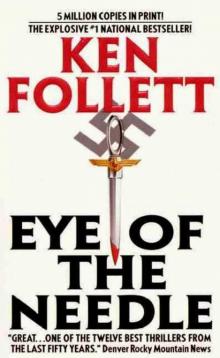 Eye Of The Needle
Eye Of The Needle Lie Down With Lions
Lie Down With Lions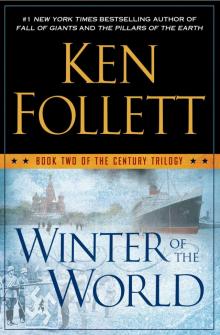 Winter of the World
Winter of the World Triple
Triple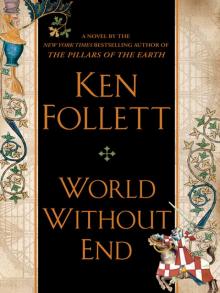 World Without End
World Without End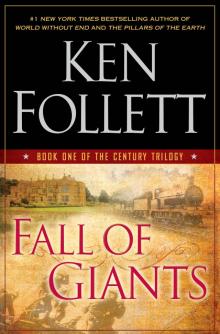 Fall of Giants
Fall of Giants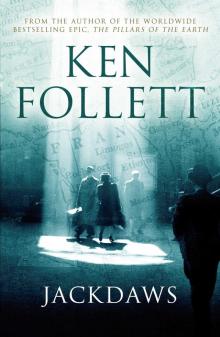 Jackdaws
Jackdaws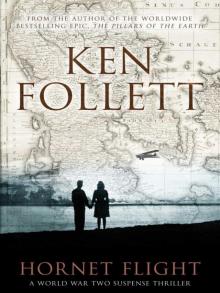 Hornet Flight
Hornet Flight Whiteout
Whiteout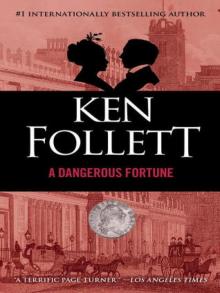 A Dangerous Fortune
A Dangerous Fortune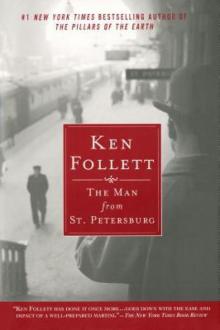 The Man From St. Petersburg
The Man From St. Petersburg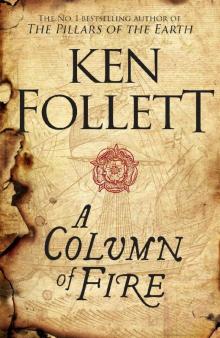 A Column of Fire
A Column of Fire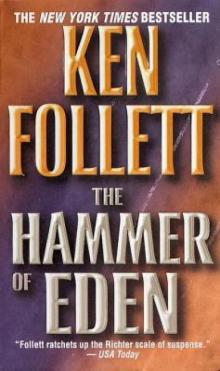 The Hammer of Eden
The Hammer of Eden On Wings of Eagles
On Wings of Eagles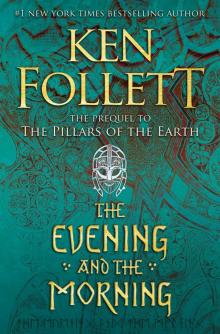 The Evening and the Morning
The Evening and the Morning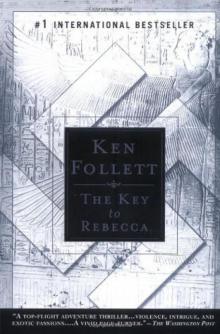 The Key to Rebecca
The Key to Rebecca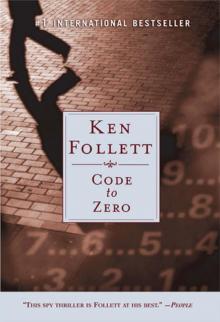 Code to Zero
Code to Zero Paper Money
Paper Money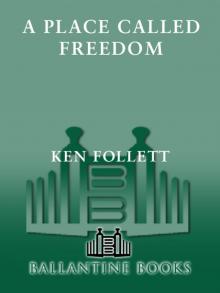 A Place Called Freedom
A Place Called Freedom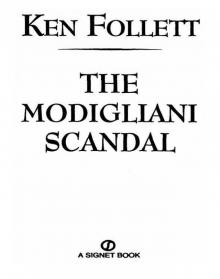 The Modigliani Scandal
The Modigliani Scandal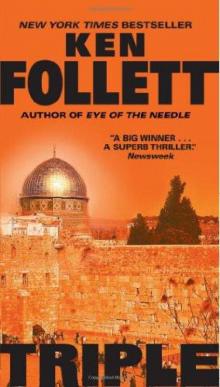 Triple (1991)
Triple (1991)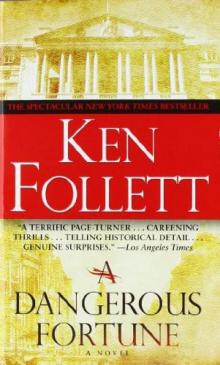 A Dangerous Fortune (1994)
A Dangerous Fortune (1994)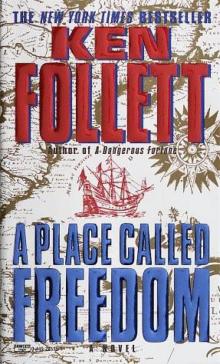 A Place Called Freedom (1995)
A Place Called Freedom (1995)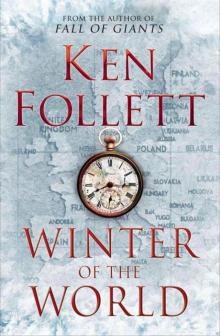 Winter of the World (Century Trilogy 2)
Winter of the World (Century Trilogy 2)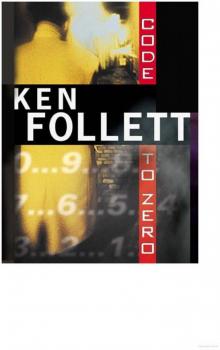 Code to Zero (2000)
Code to Zero (2000) On Wings Of Eagles (1990)
On Wings Of Eagles (1990) Storm Island
Storm Island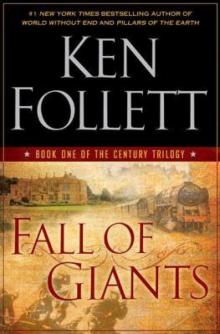 Fall of Giants (The Century Trilogy)
Fall of Giants (The Century Trilogy)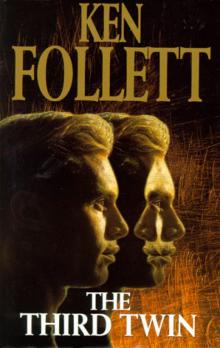 the Third Twin (1996)
the Third Twin (1996)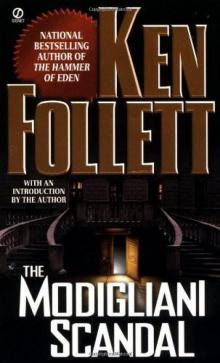 The Modigliani Scandal (1976)
The Modigliani Scandal (1976)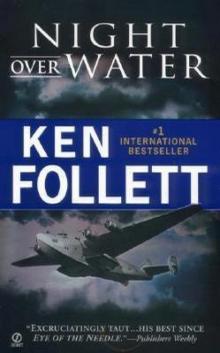 Night Over Water
Night Over Water